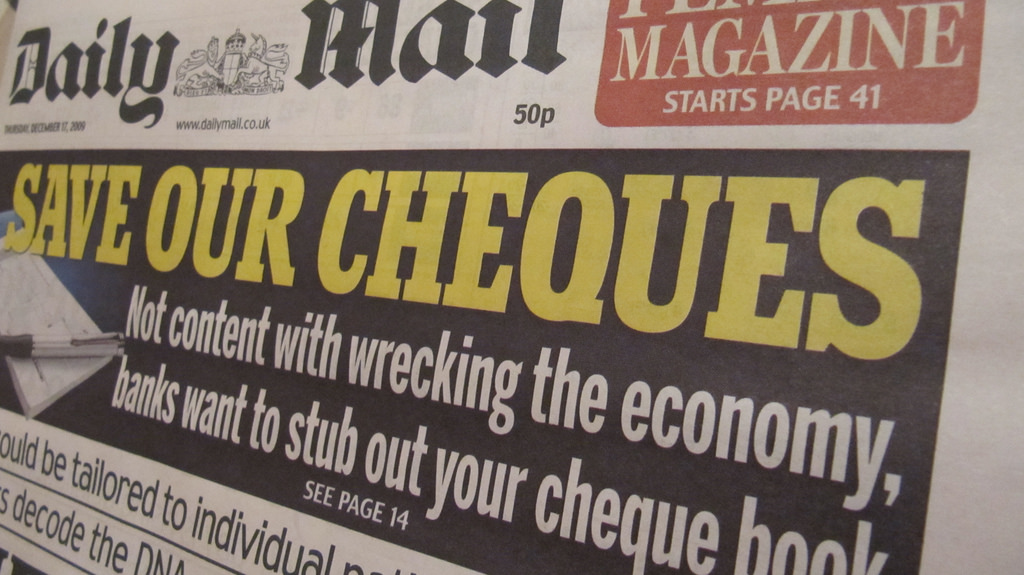
The Mail Group press – Daily Mail, Mail on Sunday and Mail Online – have topped the chart for IPSO-regulated publications with the most complaints that have required remedial action for the fourth year straight.
Building up a league table-topping dominance on a par with Manchester United in the ’90s/’00s, the Mail pipped close rival The Sun by 15 cases to 14 throughout 2019.
This is some way down on the paper’s 2018 total of 28, when it romped home 10 points clear of runner-up The Times, but enough to serve as a timely reminder of why Wikipedia classified it as an unreliable source back in 2017.
Overall in 2019, there were fewer cases involving the mainstream national press outlets that required action than in 2018. During the past 12 months, there have been 57 IPSO cases resulting in either a breach (IPSO sanction) or resolution statement (where the publication acknowledges wrongdoing and offers remedial action that satisfies the complainant, meaning that the case doesn’t need to be assessed) compared to 90 throughout 2018.
The majority of cases for all publications were related to accuracy of content, although there were a number of other breaches including harassment and invasion of privacy.
After the Mail and The Sun, The Times claimed 3rd spot with 7 sanctions/resolution statements, slipping one place from 2018. The Telegraph was fourth with 6, then the Mirror with 6, the Express with 5 and the Daily Star and the Metro with two each.
Here is a more detailed breakdown of 2019 performance:
THE MAIL
Publications: Daily Mail, Mail on Sunday, Mail Online
Well established as the IPSO chart-topper in terms of bad behaviour, the Mail has a disturbing track record that includes actively supporting fascism, association with Adolf Hitler and repeated demonisation of Jewish migrants to the UK pre-WW2. Many would say it hasn’t changed all that much in 80 years. Despite this, it remains the UK’s second best-selling daily paper after The Sun.
Total number of transgressions: 15 (6 breaches, 9 resolution statements)
Breakdown of transgressions: Mail Online (10), Daily Mail (3), Mail on Sunday (2)
Total complaints: 30 (15 dismissed)
Example case: “POWDER KEG PARIS” – a supposed expose of northern suburbs of Paris which the journalist claimed, through apparent first-hand accounts gathered during a 5-day stay, had been turned into Muslim enclaves populated by 300,000 illegal immigrants. The article was found to have multiple errors and the Mail was made to publish a full and lengthy correction, albeit over six months later.
Media Bias Fact Check assessment of the Mail here.
THE SUN
Publications: The Sun, Sun on Sunday, Scottish Sun
The biggest-selling daily paper in the UK, although sales have declined in recent years and are non-existent in Liverpool after the paper was boycotted by most of the city for its reporting on the Hillsborough tragedy. Its style of journalism is more similar to toilet wall graffiti than respectable reporting and its employees have been caught up in scandals including phone-hacking, paying police for stories and harassing celebrities about their sexuality. Not treated as a serious news source by many but people still buy it – for the sports coverage, we’re told.
Total number of transgressions: 14 (7 breaches, 7 resolution statements)
Breakdown of transgressions: The Sun (13), Scottish Sun (2)
Total complaints: 30 (16 dismissed)
Example case: “£4 BILLION FOREIGN AID TO FIX POTHOLES IN INDIA” – an article claiming that money was being wasted on aid projects overseas. However, contrary to the headline, the money was actually being used on over 50 different transport and infrastructure projects in various parts of the developing world.
Media Bias Fact Check assessment of The Sun here.
THE TIMES
Publications: The Times, Sunday Times
For a long time viewed as a respectable paper, things have changed in recent years since The Times was bought by the Murdoch empire. Over the past couple of years it has been up there with the Mail and The Sun in the end-of-year poor performance tables and even pipped The Sun to runners-up spot in 2018. Some have speculated that the gradual transformation of the paper is to prepare it to eventually step into The Sun‘s shoes should the top-selling Murdoch tabloid suddenly sink in a News Of The World-style scandal.
Total number of transgressions: 7 (3 breaches, 4 resolution statements)
Breakdown of transgressions: Sunday Times (4), The Times (3)
Total complaints: 15 (8 dismissed)
Example case: “SINKING SUPPORT FOR WATER NATIONALISATION” – an article that claimed the support for nationalisation of the water industry had fallen to 27%. However, the accurate figure was 49%. The 27% figure was drawn from a loaded question that asked if nationalisation would be supported if it led to people’s pensions being devalued.
Media Bias Fact Check assessment of The Times here.
THE TELEGRAPH
Publications: Daily Telegraph, Sunday Telegraph
Nicknamed the Torygraph, this long-standing Conservative-supporting paper isn’t in the same league as the likes of the Mail and The Sun when it comes to prolific whoppers but you still need to take what it says with a pinch of salt. Its reputation – and league table position – has been heavily affected by its employment of Boris Johnson. The current UK PM was responsible for three of the paper’s sanctions in 2019, very much the Eric Cantona of the season (sticking with the Man Utd ’90s analogies).
Total number of transgressions: 6 (2 breaches, 4 resolution statements)
Breakdown of transgressions: Daily Telegraph (5), Sunday Telegraph (1)
Total complaints: 15 (9 dismissed)
Example case: “MOSQUE WITH EXTREMIST LINKS RUNS SCOUT GROUP” – article that made inaccurate allegations about the Lewisham Islamic Centre, including that it was under police investigation for extremist links.
Media Bias Fact Check assessment of the Telegraph here.
THE MIRROR
Publications: Daily Mirror, Sunday Mirror
The only noticeably left-wing (i.e. Labour-supporting) mainstream daily paper regulated by IPSO, the Mirror is proof that dirty tabloid tactics and gutter press reporting aren’t the sole preserve of the political right. Although many would argue that it’s not really all that left-wing – after all, Piers Morgan used to be its editor. Most of its erroneous reporting tends to be about celebrity tittle-tattle rather than politics, where it quietly pursues an anti-Tory agenda without much controversy. Under Morgan’s tenure, it became embroiled in the phone-hacking scandal.
Total number of transgressions: 6 (1 breach, 5 resolution statements)
Breakdown of transgressions: Daily Mirror (6)
Total complaints: 11 (5 dismissed)
Example case: “MAN DIES AT CARE HOME WHILE AMBULANCES BLOCKED BY ANGRY NEIGHBOURS IN PARKING ROW” – report that an ambulance had been blocked in a residential area due to a neighbour’s vehicle being deliberately parked in front of it, although there was no confirmation that the ambulance had been blocked or that it had been done deliberately.
Media Bias fact Check assessment of the Mirror here.
THE EXPRESS
Publications: Daily Express, Sunday Express
Although with circulation figures much smaller than the big name tabloids, the Express has successfully out-gunned all opposition in recent years in terms of sensationalism and wacky reporting. For a long time, almost all of its content could be filed into one of five sections – attacks on migrants/refugees, attacks on the EU, stuff on Princess Diana, miracle cures for dementia and, of course, the regular warnings that we’re in for the coldest winter/hottest summer since records began. It was bought out by the Mirror Group just over a year ago and seems to have knocked the anti-immigrant reporting on the head, although shoddy Brexit content remains a daily staple.
Total number of transgressions: 5 (all breaches)
Breakdown of transgressions: Daily Express (5)
Total complaints: 9 (4 dismissed)
Example case: “WHAT BORDER PROBLEMS? MP TWEETS PHOTO OF SWISS BORDER WITH JUST ONE SIGN” – article claiming that the Brexit Irish border problem was easy to fix, as an MP had provided photo evidence of a Swiss-French border that was manned by a single camera. However, the crossing turned out not to be a border between the two countries. Furthermore, the article failed to point out that France and Switzerland are both part of the Schengen area where people can travel between countries without passport checks.
Media Bias Fact Check assessment of the Express here.
THE STAR
Publications: Daily Star, Daily Star Sunday
Tabloid once owned by the Express group, lower circulation figures than most other tabloids (less than 300,000 a day). The Star doesn’t cover much serious news, preferring to focus on celebrity stories and gossip. It doesn’t have any clear political leaning but has been guilty of publishing inaccurate and sensationalist stories.
Total number of transgressions: 2 (both resolution statements)
Breakdown of transgressions: Daily Star (2)
Total complaints: 4 (2 dismissed)
Example case: “MOMO CHALLENGE’S YOUNGEST EVER VICTIM, 3, TOLD TO HURT HERSELF” – article that inaccurately reported that there had been confirmed suicides linked to an online game called the Momo Challenge.
Media Bias Fact Check assessment of the Star here.
THE METRO
Free weekday publication that is the highest-circulation print newspaper in the UK, largely due to the fact that it is given away free. It is owned by the Daily Mail group but operates as an independent paper. It doesn’t cover news stories in great depth and reports in a more sober fashion than its owner publication, with less of a bias and fewer inaccuracies.
Total number of transgressions: 2 (both resolution statements)
Total complaints: 4 (2 dismissed)
Example case: “PARAMEDIC DRILLED INTO DRUNK’S BONE WITHOUT ANAESTHESIA TO TEACH HIM A LESSON” – article that concerned an incident that had occurred in Tennessee, US, but had given the misleading impression that it had taken place in the UK.
Media Bias Fact Check assessment of the Metro here.
Don’t like what you’re seeing in the press? If you see an article you’re unhappy with, you can email the press regulators at inquiries@ipso.co.uk to voice your concerns. If enough complaints are received, they will have to look into it.
Tabloid Corrections Facebook page: here.








